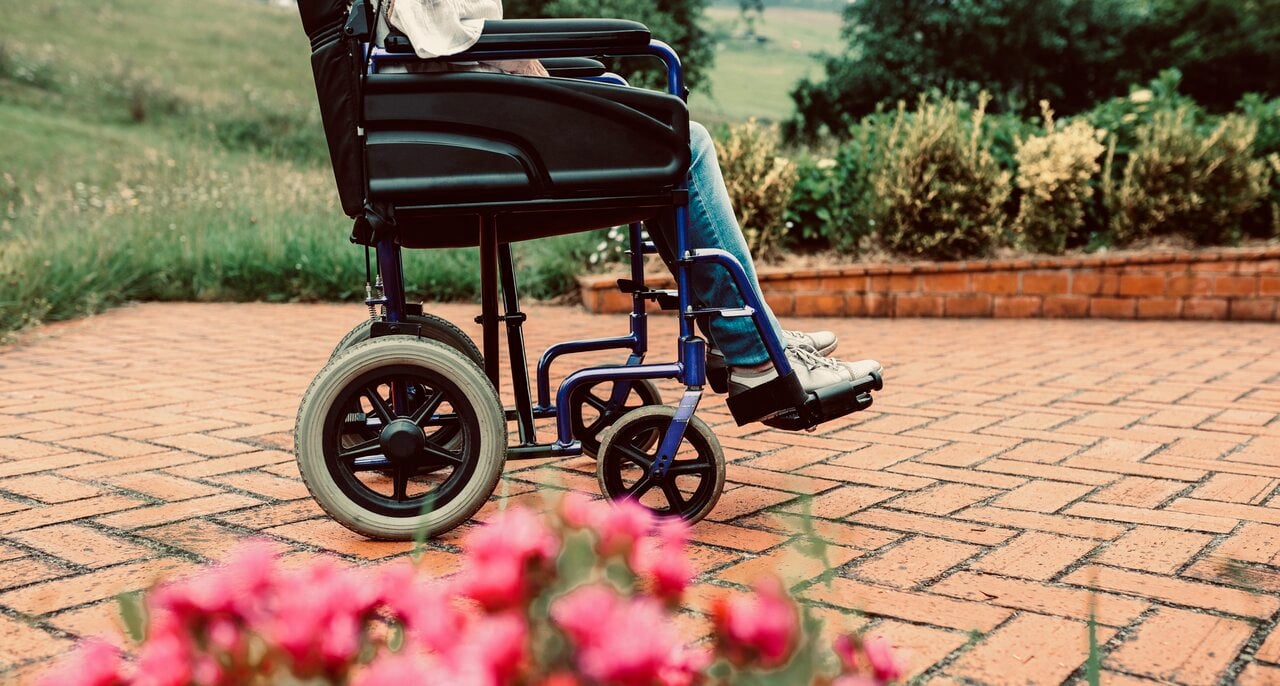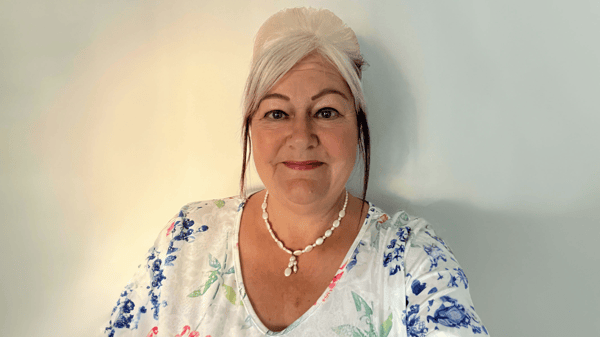Digital health providers have been talking to and with healthcare for a while now. However, at the end of the day, the patients are the end-users who will determine the value of the tool provided to them, and whether it will be picked up and used in the long run – and enable healthcare to reap the benefits it was developed for. We met Victoria Holton, a spinal injury survivor and a member of the Visiba patient panel, to discuss her valuable insights on digital health, online consultations and the patient journey, in primary and secondary care, in more detail.
Victoria Holton has been living with spinal injury for the last 18 years. After an injury at C5 (the 5th vertebra down in her neck), she is a full-time wheelchair user, with movement of her head, neck, shoulders, and inside arm muscles. Victoria is a forward-thinking individual with astonishing clarity and a pragmatic mindset, who thrives on being productive. In the last years, she has dedicated her time to improving the life quality of her peers. Victoria has participated in improvement projects with specialist clinicians, she served as a trustee of The Southern Spinal Injuries Trust, she ran an art fair in London hosting works of people with spinal injuries, and most recently she is serving as a trustee in Horatio’s Garden, a national charity focused on the wellbeing of patients with spinal injury. Horatio’s Garden was created after the loss of an inspirational young man, Horatio Chapple, who wanted to study medicine and had a vision of providing spinal injury patients with what they were craving the most: a fulfilling outdoor space. Since its conception, Horatio’s Garden has built beautiful gardens in 5 out of the 11 specialist spinal centres in the UK and a 6th one is in development. Victoria also recently got involved in a review of digital health provision for the Secretary of State for Health and Social Care in England, where she provided input from the perspective of patients.
The journey with healthcare
At the age of 31 and having never broken a single bone in her life, Victoria broke the 5th vertebra down in her neck in a skydiving accident. She spent 19 months in a spinal centre and was discharged home with live-in care. The care plan included visits from a district community nurse every 5 weeks, annual follow-up appointments with the spinal centre and of course, support from her local GP. Her first contact with digital health was when she participated in a ‘telemedicine’ trial, shortly after her discharge. Victoria tells us:
There was a trial looking at supporting people with weekly consultations by video call. I took part in that trial. When I moved out of the spinal centre, I shared a house with a person who I’d met in hospital and he had a very similar injury to me. But he was on the trial with the video conferencing equipment and I was in the control group – I didn’t have video facilities. The comparison was between these sets of recently discharged patients.
I was quite intrigued to see how his trial was going. He had weekly calls, sometimes with a nurse, sometimes with a clinical psychologist – all sorts of different inputs that he was getting that I wasn’t and that was quite interesting from my point of view: Seeing what was available and how he was supported, whereas I just had my normal post-discharge three-month check-up. At one point, he was quite unwell, so I used his technology to talk to his consultant and find out some information for him, because he wasn’t well enough to do it himself. Suddenly I discovered ‘this is good! I wish I had this!
Around the same time, Victoria’s then-consultant Dr Anba Soopramanien, a digital health pioneer with extensive research activity in the premise, involved her in digital health. Most recently, Victoria was the beta tester of the patient flow and online services of Dr Soopramanien’s virtual clinic, powered by Visiba Care, to provide input.
The benefits of digital health
As far as her present experience with her regular healthcare appointments at her GP’s or at the spinal centre, Victoria tells us that it has been mostly via telephone. However, Victoria sees great advantages with technology.
I think any additional senses a clinician could use would be beneficial: Being able to see the patient they’re talking to as well as being able to hear them has got to be better. It seems like a very simple step forward for people who have the technology – a computer, a tablet, a smartphone. If it can be used, then it makes good sense to use it. Getting multidisciplinary teams together, potentially from a hospital and from the community, becomes a simpler and more efficient task when using technology. Also, there are so many benefits to being able to see a person inside their home.
Victoria applied this input to her experience:
I know for example that my 5-weekly appointment with a community nurse is always a little bit of a nightmare. I am catheterised and the catheter is never easy to remove and it is very difficult to get the new one in. My catheter goes through my abdomen and changing it is always a pretty horrendous experience. I’m never going to be able to get my consultant to watch my procedure in person at my home but could so easily achieve this by video call to gain advice on how the change might be improved.
It does tend to open up so many other opportunities as well for a clinician to see somebody in their home environment. If a patient says ‘I’ve got lots of pain’, the cause might be identified by sight. In the world of spinal cord injury, posture is important and if you have got somebody who is leaning on an angle, if their posture is bad, that possible reason for the pain can be easily seen with a video call. There are so many opportunities of getting solution with minimal travel, minimal cost and minimal exertion. It’s not a cure-all for every scenario but I really believe it does have a lot to offer.
What do digital health tools need from a patient’s perspective?
Victoria’s insight and engagement led her to be part of a webinar at The King’s Fund, where she joined healthcare professionals from secondary and integrated care, representation from Health Education England and Visiba’s own Tina Marshall, to discuss quality standards in accelerated digital transformation. On this note, we asked Victoria what the irrevocable prerequisites in digital tools offered by healthcare providers are, and particularly the NHS. Victoria stressed the importance of a future-proof solution that speaks to other electronic systems:
It needs to be a system that is as far as possible designed for the future – it’s so difficult when technology moves so quickly. The system needs to be joined up. I know at the moment that if I call an out-of-hours GP, they won’t have access to my medical records. Having a system where my records could be accessed by anybody in healthcare I talk to would be great. I think there’s a lot to be gained by being able to see a patient, as well as being able to listen to them. On occasion, being able to touch and smell; those senses are important as well, but an initial consultation by video call could be a huge timesaver and save resources
Victoria was also adamant about security:
I feel we’ve done a very rapid spurt of development at the moment to cope with the situation that covid brings, so perhaps we need to step back and think a little bit more about the security. One concern for me is the security of anything that goes digitally, e.g. if I took an image and sent it somewhere, that could potentially be a personal, intimate part of the body. It’s one thing showing this to a clinician in a private consulting room but when you have a record of that and you send it somewhere, you don’t really want that to be seen by anyone except the clinician who is going to form a treatment plan.
A third point made by Victoria was accessibility. For her, it’s so much more than just deploying a virtual clinic for the digitally savvy or the generally healthy population – patients with a different level of familiarity with technology, patients with chronic conditions, different levels of accessibility to hardware and a stable internet connection, as well as the digitally excluded should be part of the conversation.
It’s important that a system isn’t developed that becomes two-tier. There are people who aren’t tech savvy, people who can’t use or can’t afford computers, how can their healthcare be delivered? There are people who will find technology quite alienating and very difficult. Their needs must be addressed as well.
Victoria’s thoughts were echoed in the recent webinar ‘The future of health and care’ of the NHS Confederation on the platform of the of NHS reset discussion. On the topic of digital health solutions, Dr Farzana Hussain, PCN clinical Director at Newham Central, stressed the importance of making digital patient pathways that do not accentuate digital literacy inequalities available to everyone who has the possibility to use them and essentially free up the phone lines for those who don’t have this possibility.
Accessible digital health for the digitally challenged and the chronically ill has been an ongoing discussion. We spoke with Henriette, another patient with a chronic condition who has not been the biggest fan of technology about her surprising experience with online consultations.
Digital health for the spinal injury community
Showing her profound engagement with her community, Victoria was able to add feedback from her peers and their experience to our discussion. The feedback on digital contact with healthcare was overall positive, with spinal cord injury patients reporting as positives that accessing healthcare digitally is easy, time-saving and convenient, as it eliminates the need to physically travel to a health centre, which can be a challenge for patients with mobility limitations; Quick, as booking a face-to-face appointment, particularly a routine one, can take weeks; Environmentally friendly, as it eliminates the travel emissions. Some people also reported reduced stress – Victoria describes:
Some people don’t have live-in care. If they’ve got a nurse or a carer who comes in at 9 in the morning and they’ve got somewhere to be by 11, it can be quite stressful getting up and travelling to an appointment on-time.
The feedback also included areas of improvement. A patient missed a follow-up appointment due to a poor internet connection. Some patients commented on the low sound quality of a phone consultation and deemed a quality video call likely to be a better solution. Lastly, patients reported the impersonality of emailing the details of a condition as they were concerned about misinterpretation.
With secondary care, and particularly spinal rehabilitation, Victoria laid out the reality of a visit to such a centre and the potential benefits of an online consultation:
There are only 11 specialist spinal centres in the UK and so each covers a large geographical area; it could easily be a 3-4 hour journey each way, to and from the spinal centre. With travel time, a face-to-face appointment at the spinal centre could potentially take up most of a day. Following the consultation, further testing might be needed which would take place at a different appointment on a different day so a patient currently has to wait for the appointment details to arrive in the post and then make the long journeys to and from hospital again. Being able to shortcut some of this, for example – having the first consultation by video-call, it just seems so sensible – it could be a massive time saver for the user. It’s not going to be suitable for everyone but it could be really beneficial for many.
During Victoria’s interview, we were profoundly tuned in and eager to hear her thoughts and perspective. Right now, we are just thrilled and grateful to have someone like Victoria, who shares our vision on how to deliver quality digital health; We are excited to receive her thoughts on a regular basis and apply them to improve the quality of our solution ¬for patients.
Are you interested in what our patient panel is all about? Maybe you are intrigued to join? Find out more here!


